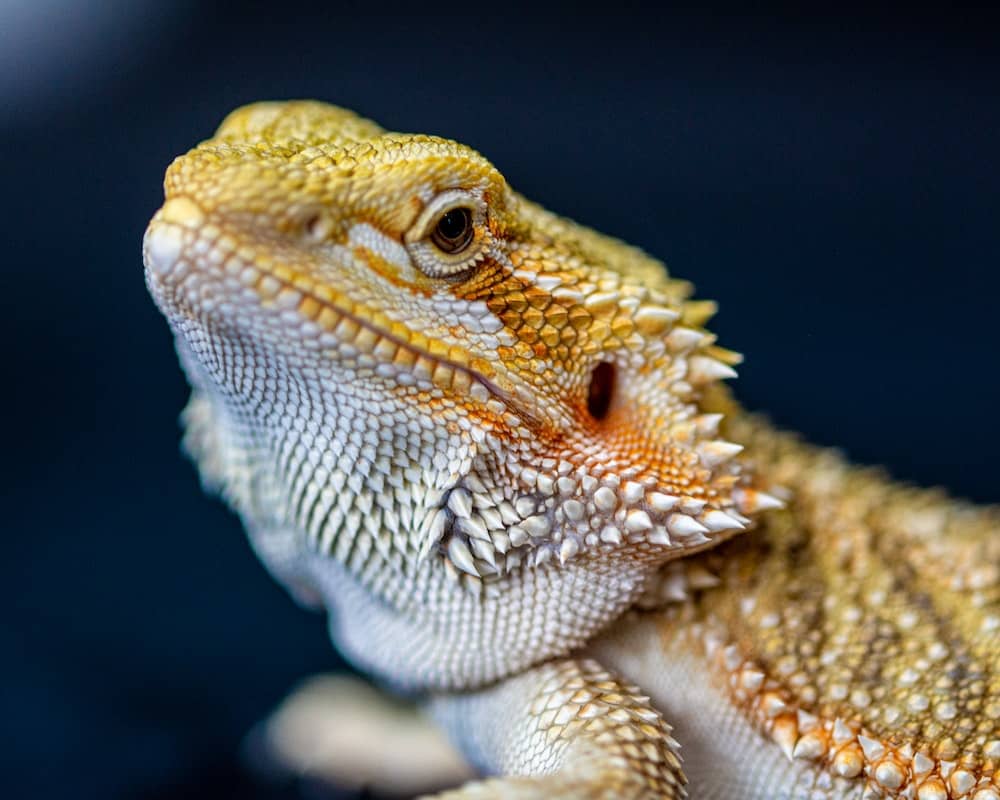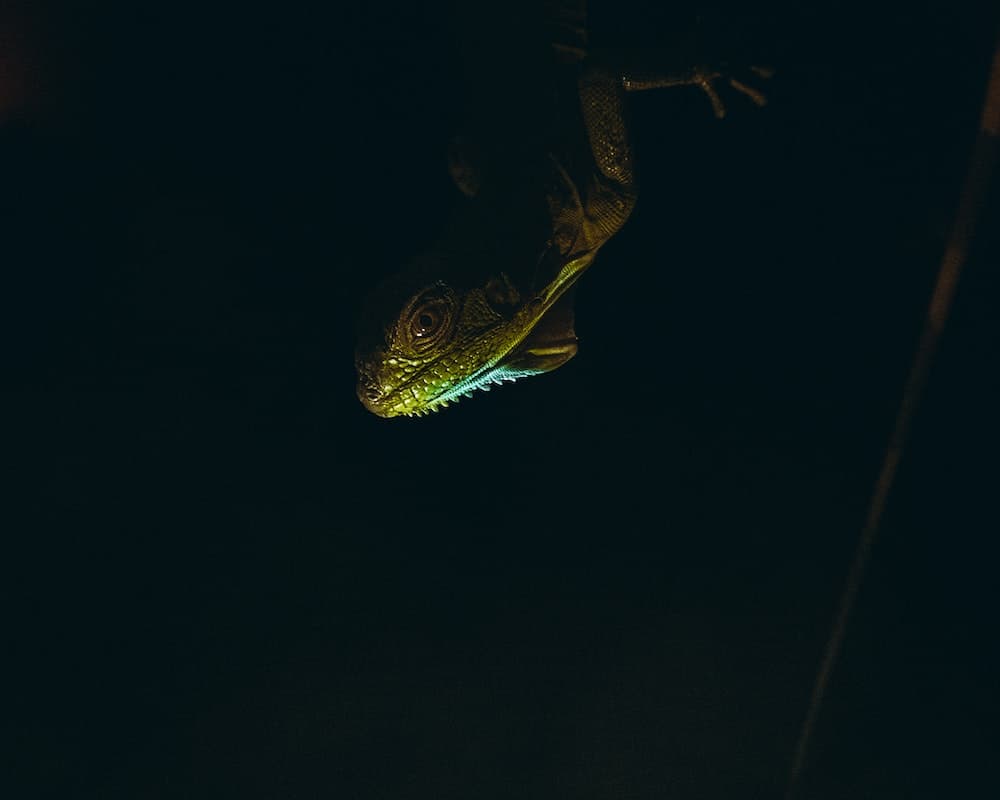What are common bearded dragon eye infection symptoms? Are its eyes swollen? Is there any change in the way its eyes look or is there any change in the behaviour of the bearded dragon? Are you worried that there are symptoms of an eye problem but what to do about it?
Swollen eyes, not being able to open eyes, eyes becoming red, a discharge coming out of eyes, cloudy eyes, and reptiles repeatedly starting to scratch their eyes are some of the major symptoms that would indicate an eye infection in a bearded dragon.
In this article, we will discuss some of the common eye problems, causes, and signs of infections in a bearded dragon, along with some of the preventive measures.
4 Common Bearded Dragon Eye Infection Symptoms
- Infections
Eye infections in bearded dragons are common and can be brought on by bacteria, viruses, or fungi. Diseases can arise whenever the dragon’s immune response is weakened, which is generally the result of poor husbandry or insufficient diet.
When a bearded dragon gets an eye infection it is very important to cure it by giving various anti-inflammatory drugs.
Antifungal medicines etc to help prevent further spread and make the bearded dragon safe from further infections.
- Eye Injuries
Eye injuries in bearded dragons are a common problem that can be caused by a variety of circumstances such as battles with other reptiles, accidents in the habitat, or scratching their eyes on pointy things. Eye injuries can lead to various harmful problems like ulcerations, etc
It is very important to discover if bearded dragons have any injuries in their eyes as soon as possible. If you feel your bearded dragon does have an eye injury, you should seek veterinary attention right once.
The veterinarian can determine the severity of the injury and prescribe the best course of action, which might involve antibiotics, anti-inflammatory medicine, or surgery.
- Eye Bulging
A veterinarian should be consulted right once if a bearded dragon’s eye bulges since it can be a dangerous problem.
Many disorders, such as infections, abscesses, tumors, or trauma toward the eyes or surrounding tissues, can result in eye bulging.
The underlying source of the issue will determine how to treat bulging eyes in bearded dragons.
To identify the reason for the bulge, a veterinarian would normally perform a complete inspection of a bearded dragon’s eye. Depending on the underlying source of the illness, treatment options may include antibiotics, antifungal medicine, topical therapies, vitamin supplements, anti-inflammatory medication, or surgery.
- Eye Shedding Or Watering
Bearded dragon’s eyes may shed or water for a variety of reasons, including the environment, nutrient deficits, infections, or injuries.
To identify the origin of the problem, a bearded dragon’s eye will normally be thoroughly examined by a veterinarian. Antibiotics, antifungal drugs, topical therapies, dietary supplements, or alterations to the bearded dragon’s habitat or diet are all possible forms of treatment. If your bearded dragon’s eyes are shedding or watering, you should consult a vet right away to avoid the situation getting worse.
5 Common Signs of Eye Infection in Bearded Dragon
- Swollen Eyelids
Swollen eyelids are a classic condition of bearded dragon eye infection. Inflammation or swelling can be caused by bacterial, viral, fungal, or parasitic infections.
Swollen eyelids may additionally be a sign of other health problems, such as a lack of vitamin A, poor environmental circumstances, or injury.
- Eye Discharge
Eye discharge in bearded dragons might be a sign of an eye infection. Some of the major causes of the discharge from eyes in bearded dragons are fungi, viruses, parasites, etc.
Vitamin A deficiency or trauma in bearded dragons can be other reasons for a discharge in bearded dragons.
- Cloudiness
Cloudiness in a bearded dragon’s eye can be a sign of an eye disease. Eye cloudiness can be caused by a variety of reasons, such as bacterial or fungal infections, physical damage, or a vitamin A deficiency.
If left untreated, the cloudiness may appear inside one or both eyes and may increase over time.
- Redness
Redness in the eye of a bearded dragon is usually accompanied by other symptoms like swollen eyes, and discharge. This is one of the significant symptoms of an eye infection in bearded dragons. Eye redness can also indicate other health problems such as a lack of vitamin A, injury, or environmental conditions.
- Scratching of Eyes
Scratching of eyes by bearded dragons is another symptom indicating an eye infection in these animals. It can be caused by attacks of parasites or poor hygiene.
Improper diet or low intake of vitamin A or an unhealthy environment also add up to the possible reasons for a bearded eye scratching its eyes.
Top 5 Causes of Eye Infections In Bearded Dragons
- Vitamin A Deficiency
Vitamin A deficiency is frequent in bearded dragons and, therefore, can lead to a range of health issues, including eye problems. Vitamin A is required for healthy skin, eyesight, and reproductive function.
It is extremely crucial to discover the deficiency in bearded dragons as soon as possible. In some situations, more aggressive therapy, such as hospitalization and supportive care, may be required for the bearded dragon.
Avoiding deficiencies in vitamin A is critical, and this can be accomplished through a well-balanced diet rich in vitamin A-rich vegetables and fruits.
- Parasites
Parasites are a significant reason for bearded dragon eye disorders. Parasites like nematodes and cestodes can attack bearded dragons and create health issues like eye infections.
To prevent the spread of parasites, it is critical to practice basic hygiene and cleanliness, as in a bearded dragon’s enclosure.
Frequent fecal inspections and deworming are also necessary to keep bearded dragons parasite-free.
- Bacterial or Fungal Infections
Bacterial and fungal infections are prevalent causes of bearded dragon eye infections. Bacteria can enter the eye via a scrape or injury, or they might spread from elsewhere in the body.
Fungal infections can also induce bearded dragon eye infections. These infections might occur as a result of poor hygiene or an inadequate diet.
- Environmental Factors and Poor Hygiene
Dust, debris, and other environmental conditions in the bearded dragon’s environment can irritate and infect the eyes. Infections can be caused by poor hygiene standards, such as a failure to clean and disinfect the cage or equipment.
- Physical Trauma
A bearded dragon might be in a physical trauma like past injuries or an injury near the eye which makes a bearded dragon irritated and regularly scratches its eye which eventually leads to an eye infection.
Possible Treatment For Eye Infections In Bearded Dragon
The treatment given to a bearded dragon for its eye infection will depend upon what caused the infection in the eyes of bearded dragons.
Some of the basic treatments that could be given to bearded dragons are:
- Topical Antibiotics
Bacterial infections of the eye are frequently treated with topical antibiotics. Bearded dragons are susceptible to fungus infections in many physiological systems, such as the skin, respiratory system, and digestive system.
Antibiotics may be given by means of eye drops or ointment and are directly applied to the afflicted eye. Topical medications act by either killing or inhibiting the growth and reproduction of the fungus.
- Antifungal Medication
Bearded dragons with fungal infections can be treated with antifungal medications. Bearded dragons are susceptible to fungus infections in many physiological systems, such as the skin, respiratory system, and digestive system.
Antifungal medications act by either killing or inhibiting the growth and reproduction of fungi.
- Anti Inflammatory Drugs
Anti-inflammatory medications can be used to treat the signs of bearded dragon eye infections.
The inflammation of the eye and its surrounding tissues, which can result in redness, inflammation, pain, and discomfort, can be brought on by diseases in bearded dragons.
Anti-inflammatory medications operate by lowering edema and inflammation in the injured area. This can aid in easing discomfort and pain while also improving the bearded dragon’s general health.
- Nutritional Supplements
Supplemental nutrition may be helpful in the management of bearded dragon eye infections. The bearded dragon’s general health and immune system can be improved, which can speed up the healing process, even though it does not directly cure the infection.
Foods that contain vitamin A are highly nutritious and helpful for bearded dragons to improve their health.
- Surgery
For some bearded dragon eye issues, like abscesses or tumors, surgery could be required.
In some circumstances, the afflicted tissue may have to be removed in order to protect the eye or other tissue from further harm.
Preventive Measures
- Hygiene Measures
To stop the infection from spreading, it’s crucial to practice excellent hygiene. This can involve rinsing your hands prior to and following touching your bearded dragon, as well as cleaning and sanitizing the equipment and cage.
- Maintain Humidity Levels
To stay healthy, bearded dragons need a specific amount of humidity. On the other hand, abnormally high humidity levels might promote the development of germs and fungi that can infect the eyes. Keep an eye on the enclosure’s humidity levels and make any necessary adjustments.
- Provide A Balanced Diet
Maintaining the good health and immune system of bearded dragons requires a balanced diet. Make careful to offer a balanced diet with a variety of fruits, vegetables, and insects.
- Provide Appropriate Lighting and Temperature
For the good health and well-being of bearded dragons, appropriate temperature and lighting are crucial. Their immune system can be weakened by unsuitable temperature and lighting, which increases their susceptibility to illnesses, especially eye infections.
- Handle Your Bearded Dragon With Care
Stress or rough treatment can decrease a bearded dragon’s immune system, making them more prone to illnesses, especially eye infections. Be gentle when handling your bearded dragon to reduce unneeded stress.
- Regular Veterinary Check-Ups
Regular veterinarian check-ups are really crucial in preventing eye infections in bearded dragons. Regular check-ups may also help you discover an infection at an early stage and help you stop spreading it even further.
Bearded Dragons can also get ear infections, check out our article that explains ear infection symptoms and what to look out for.




